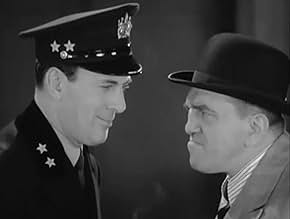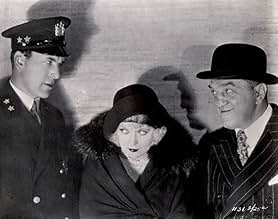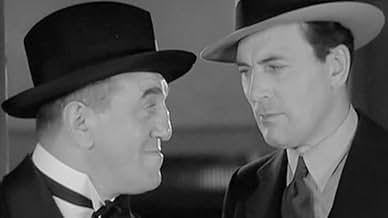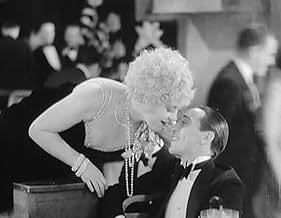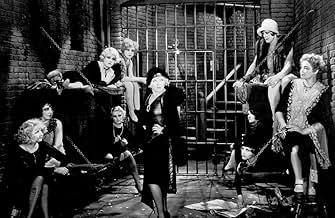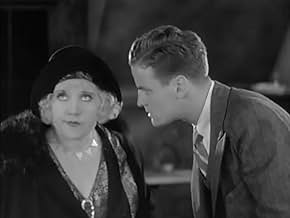AVALIAÇÃO DA IMDb
6,6/10
1,7 mil
SUA AVALIAÇÃO
Adicionar um enredo no seu idiomaAn honest police captain vows to bring down a powerful bootlegger who is protected by corrupt politicians and judges.An honest police captain vows to bring down a powerful bootlegger who is protected by corrupt politicians and judges.An honest police captain vows to bring down a powerful bootlegger who is protected by corrupt politicians and judges.
- Indicado a 1 Oscar
- 3 vitórias e 1 indicação no total
G. Pat Collins
- Patrolman Johnson
- (as Pat Collins)
George E. Stone
- Joe Scarsi
- (as George Stone)
Sam De Grasse
- District Attorney Welch
- (as Sam DeGrasse)
Richard 'Skeets' Gallagher
- Miller
- (as Skeets Gallagher)
Frank Austin
- Man at Funeral
- (não creditado)
Walter Brennan
- Man on Street in Front of Barber Shop
- (não creditado)
Jimmy Dime
- Rival Gang Lookout
- (não creditado)
Jim Farley
- Detective
- (não creditado)
Sherry Hall
- Orchestra Leader
- (não creditado)
Sydney Jarvis
- Bartender
- (não creditado)
Enredo
Você sabia?
- CuriosidadesOnly one copy of the film is known to have survived. It was long thought lost before being located in Howard Hughes' film collection after his death. The film was restored and preserved by the University of Nevada, Las Vegas film department. The restored copy is frequently shown on Turner Classic Movies in the US.
- Erros de gravaçãoMcQuigg's holster is embossed with his name and rank, but it also says CITY OF followed by a blank space.
- Citações
Cub Reporter Ames: I told you not to look after me... Why did you do it?
Helen Hayes: Because - -- because you affect me like a mammy song.
- Versões alternativasIn 2004, The University of Nevada, Las Vegas and Flicker Alley, LLC copyrighted a new digital version with a new orchestral score composed, arranged and conducted by Robert Israel. It was produced by Jeffery Masino and runs 84 minutes.
- ConexõesReferenced in Public Enemies: The Golden Age of the Gangster Film (2008)
Avaliação em destaque
I watched this in anticipation of Josef von Sternberg's UNDERWORLD (1927), a film that revolutionized the gangster genre – which THE RACKET is as well (I am already familiar with its 1951 remake from the same producer, Howard Hughes). Playwright Bartlett Cormack helped adapt his own work to the screen; interestingly, the chief hoodlum during the original theatrical run was essayed by Edward G. Robinson – who would achieve movie stardom with a similar role in LITTLE CAESAR (1930)!
Though the original was nominated for the Best Picture Oscar, ultimately, I still think that the later version is superior (even if nominal director John Cromwell ended up getting replaced by Nicholas Ray!) – principally because there the antagonistic relationship at its core was formidably filled by Roberts Mitchum and Ryan! In this version, we have forgotten star Thomas Meighan as the quintessential (albeit over-age) Irish cop and burly but suitably smarmy Louis Wolheim (who would re-unite with director Milestone for his Oscar-winning masterpiece ALL QUIET ON THE WESTERN FRONT [1930]). From what I can recall, the plot is pretty much identical between the two versions (for the record, I own Warner's SE DVD of the 1951 movie, while the earlier one was restored for DVD release by Silent-movie specialists Flicker Alley but it somehow never hit stores!): the gangster not only muscles in on a rival (the entire mob's come-uppance in a speak-easy, during a party thrown in honor of Wolheim's younger brother no less, is superbly realized by Milestone) but even seems to have authority figures under his thumb (recalling in this way the recently-viewed THE GLASS KEY [1935], down to a car-accident-turned-murder-rap which sends a ripple through the already murky waters) – so that, no matter what he or his associates do, they are sure to get away scott-free!
In both, there is also a girl – pretty but spirited Marie Prevost in 1928, sultry-yet-dull Lizabeth Scott in 1951 – who first gets embroiled in the villain's schemes and, then, becomes a pawn in the protagonists' struggle for supremacy (which sees Meighan transferred to a precinct far removed from the center of activities and Wolheim tripping himself up by personally exacting revenge upon the cop who arrested his sibling). On the side-lines are a trio of reporters, two vaguely comical (though their antics only seem to exacerbate the feud between policeman and criminal!) and the other a rookie (who becomes involved with Prevost, and is actually the one to bring the villain to book) – his eventual demise, then, emerges to be heavily tinged with irony!
Though the original was nominated for the Best Picture Oscar, ultimately, I still think that the later version is superior (even if nominal director John Cromwell ended up getting replaced by Nicholas Ray!) – principally because there the antagonistic relationship at its core was formidably filled by Roberts Mitchum and Ryan! In this version, we have forgotten star Thomas Meighan as the quintessential (albeit over-age) Irish cop and burly but suitably smarmy Louis Wolheim (who would re-unite with director Milestone for his Oscar-winning masterpiece ALL QUIET ON THE WESTERN FRONT [1930]). From what I can recall, the plot is pretty much identical between the two versions (for the record, I own Warner's SE DVD of the 1951 movie, while the earlier one was restored for DVD release by Silent-movie specialists Flicker Alley but it somehow never hit stores!): the gangster not only muscles in on a rival (the entire mob's come-uppance in a speak-easy, during a party thrown in honor of Wolheim's younger brother no less, is superbly realized by Milestone) but even seems to have authority figures under his thumb (recalling in this way the recently-viewed THE GLASS KEY [1935], down to a car-accident-turned-murder-rap which sends a ripple through the already murky waters) – so that, no matter what he or his associates do, they are sure to get away scott-free!
In both, there is also a girl – pretty but spirited Marie Prevost in 1928, sultry-yet-dull Lizabeth Scott in 1951 – who first gets embroiled in the villain's schemes and, then, becomes a pawn in the protagonists' struggle for supremacy (which sees Meighan transferred to a precinct far removed from the center of activities and Wolheim tripping himself up by personally exacting revenge upon the cop who arrested his sibling). On the side-lines are a trio of reporters, two vaguely comical (though their antics only seem to exacerbate the feud between policeman and criminal!) and the other a rookie (who becomes involved with Prevost, and is actually the one to bring the villain to book) – his eventual demise, then, emerges to be heavily tinged with irony!
- Bunuel1976
- 4 de mar. de 2011
- Link permanente
Principais escolhas
Faça login para avaliar e ver a lista de recomendações personalizadas
- How long is The Racket?Fornecido pela Alexa
Detalhes
- Tempo de duração1 hora 24 minutos
- Cor
- Mixagem de som
- Proporção
- 1.33 : 1
Contribua para esta página
Sugerir uma alteração ou adicionar conteúdo ausente

Principal brecha
By what name was A Lei dos Fortes (1928) officially released in India in English?
Responda
